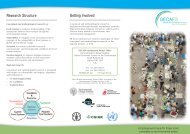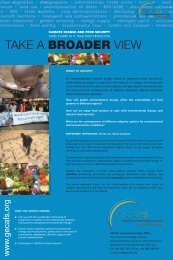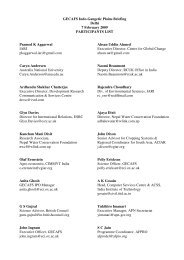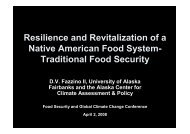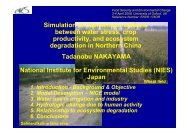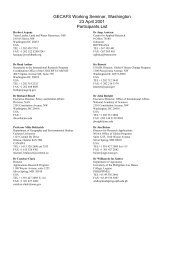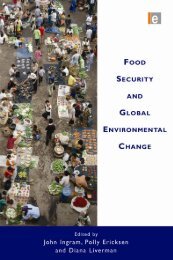in<strong>to</strong> actions (strategies, policies, interventions, technologies) leading <strong>to</strong> better and more sustainablelivelihoods.5 Learning orientationResearch projects are more likely <strong>to</strong> be successful in linking knowledge with action when they aredesigned as much for learning as they are for knowing. Such projects are frankly experimental,expecting and embracing failures so as <strong>to</strong> learn from them throughout the project’s life. Such learningdemands that risk-taking managers are funded, rewarded and regularly evaluated by external experts.6 Continuity with flexibilityGetting research in<strong>to</strong> use requires strengthening links between organizations and individuals operatinglocally, building strong networks and innovation/response capacity, and co-creating communicationstrategies and boundary objects/products.7 Manage asymmetries of powerEfforts linking knowledge with action are more likely <strong>to</strong> be successful when they manage <strong>to</strong> ‘level theplaying field’ <strong>to</strong> generate hybrid, co-created knowledge and deal with the often large (and largelyhidden) asymmetries of power felt by stakeholders.Who are the stakeholders in the GEC–food security debate?The term stakeholder is now commonly employed <strong>to</strong> denote ‘all parties with a voluntary orinvoluntary legitimate interest in a project or entity’ (Brklacich et al., 2007). For issues offood security, in addition <strong>to</strong> those involved in the food system activities per se (e.g. foodproducers, processes, packers, distribu<strong>to</strong>rs, retailers, consumers), stakeholders includefunding agencies, national/regional policy agencies, non-governmental organizations(NGOs), civil society groups, business (and increasingly the energy sec<strong>to</strong>r, as opposed <strong>to</strong>biofuels), individuals and communities affected by GEC, and the researchers themselves. Forresearch projects that involve a significant natural resource management component at thelocal level (as is often the case in field-based, food production research), the resourcemanagers (who are often, but not exclusively, farmers, fishers, pas<strong>to</strong>ralists, etc.) themselvesare usually critically important stakeholders. Indeed, methods and approaches for identifyingand engaging farmers in the research process, especially in the development agriculturearena, have given rise <strong>to</strong> a wide body of literature (Chambers et al., 1989; Okali et al., 1994;Martin and Shering<strong>to</strong>n, 1997; Haggar et al., 2001; Ortiz et al., 2008a).The initial problem facing researchers is <strong>to</strong> identify who the other stakeholders are, that is,with whom researchers should aim <strong>to</strong> engage. This can be helped by being clear not only onwho the intended target or beneficiary groups are (e.g. impoverished smallholder farmers;urban communities) but also on how food security research is intended <strong>to</strong> assist them. Thismeans establishing by what route, and mediated by which institutions and structures, the66
esearch output will bring about benefit. Because of this it is key ac<strong>to</strong>rs in these domains (e.g.regional policy-makers, donors) who may actually be the more important stakeholders for agiven research project than the ‘target’ beneficiaries themselves; in other words, benefit forthe ‘target’ beneficiaries would come about through the development of better policies at theregional level. (It is useful <strong>to</strong> note the value of the role of funding bodies in facilitating themaking of these important connections as part of the funding process.)For research at higher levels of integration on a number of different scales (e.g. spatial,political, jurisdictional) and particularly regarding food security policy (as opposed <strong>to</strong> foodproduction), it is perhaps not appropriate <strong>to</strong> include individual farmers as stakeholders in theresearch process. However, as they (<strong>to</strong>gether with other members of society) are obviouslyamong the ultimate beneficiaries of the research effort, it may well be appropriate <strong>to</strong> engagewith regional organizations that represent farming groups, as this can help ensure the interestsand constraints of the farming community are included in research design. Thus, in the caseof GECAFS research in southern Africa, the formalization of collaboration with the <strong>Food</strong>,Agriculture and Natural Resources Policy Analysis Network (FANRPAN, which comprisesnational farmers’ organizations; www.fanrpan.org) proved useful in this regard.For food security research at regional level it is possible <strong>to</strong> identify four main stakeholdercategories: research, government, business and civil society. As food security is a multifac<strong>to</strong>rissue, no single stakeholder has the complete answer or the power and the <strong>to</strong>ols <strong>to</strong>realize the changes that will be needed. Cooperation between those involved in thesestakeholder communities is required. Stakeholder dialogue necessarily plays an importantrole (van Tulder and van der Zwart, 2006) and can contribute <strong>to</strong> agenda-setting, the analysisof a given situation and <strong>to</strong> the creation and implementation of solutions. However, the factthat none of the stakeholders can be successful without the others presents a strong argumentfor further intensification of the dialogue process, going beyond consulting and informingeach other (i.e. stakeholder dialogue), <strong>to</strong>ward co-production of knowledge and sharedresponsibilities (i.e. stakeholder engagement) (Rischard, 2001; Henrichs et al., 2010). Thisrequires multidisciplinary research teams coming <strong>to</strong>gether with other stakeholders <strong>to</strong> work onspecific problems in the ‘real world’ (Gibbons et al., 1994). It must be noted however thatstakeholders play a multitude of different roles in the food system. They often have differentgoals and agendas that may appear <strong>to</strong> be (or really are) conflicting.A further complication is that food systems are inherently multi-scale and multi-level and thenon-spatial scales are very relevant <strong>to</strong> food security/GEC interactions (Ericksen et al., 2009).Different stakeholders operate on different scales and levels; scale and level need <strong>to</strong> beclearly specified in research engagement activities. Identifying a discrete list of stakeholdersfor a given situation is therefore far from simple, and the notion held by many researchers of‘engaging with stakeholders’, while well intentioned, needs <strong>to</strong> be approached with awarenessof the nature and magnitude of the task and especially when working at more local levels (seeBox 2). Indeed the success of the project can depend very much on how this stakeholderengagement is envisioned and implemented, and who is at the table.67
- Page 1 and 2:
From Food Production to Food Securi
- Page 3 and 4:
From Food Production to Food Securi
- Page 5 and 6:
Table of ContentsAbstract .........
- Page 7 and 8:
Paper 6: Undertaking Research at th
- Page 9:
AbstractFood security is a conditio
- Page 12 and 13:
2010 about 925 million people had t
- Page 14 and 15:
water) are used, and reduce negativ
- Page 16 and 17:
While the flow of the argument abou
- Page 18 and 19:
determine interactions along and be
- Page 20 and 21:
Paper 3: A Food Systems Approach to
- Page 23:
From Food Production to Food Securi
- Page 26 and 27: concerns and are now issues that mu
- Page 28 and 29: the relationships between GEC and f
- Page 30 and 31: Theme 2 aims to understand how comm
- Page 32 and 33: GEC and the Food System of the Indo
- Page 34 and 35: Paper 2: The role of agronomic rese
- Page 36 and 37: These advances have resulted from a
- Page 38 and 39: Crop selection to determine mechani
- Page 40 and 41: Agronomic science is central to imp
- Page 42 and 43: Agronomic research in relation to f
- Page 44 and 45: The discussion above identifies a n
- Page 46 and 47: interventions and political inertia
- Page 48 and 49: While research on producing food ha
- Page 50 and 51: Box 1 Food system Activities and fo
- Page 52 and 53: In addition to broadening the debat
- Page 54 and 55: options. Examples already seen rang
- Page 56 and 57: Figure 3 Outcomes for 10 variables
- Page 58 and 59: Figure 4 Nine ‘planetary boundari
- Page 60 and 61: Figure 5 Environmental change, food
- Page 62 and 63: Table 1: Indicative analysis of the
- Page 65: From Food Production to Food Securi
- Page 68 and 69: Trade Agreement (NAFTA) and the Eur
- Page 70 and 71: Parry et al., 2005). Conducting foo
- Page 72 and 73: is provided in the ESF/COST Forward
- Page 74 and 75: Paper 5: Engaging Stakeholders at t
- Page 78 and 79: Box 2 Engaging with stakeholders in
- Page 80 and 81: Box 3 Setting the research agenda f
- Page 82 and 83: Third, and of considerable practica
- Page 84 and 85: Figure 2: Organizing and understand
- Page 86 and 87: organizations made up of numerous n
- Page 88 and 89: Elements of good practice in stakeh
- Page 90 and 91: Finally, it is worth noting that fo
- Page 92 and 93: development (Lee, 1999; Gunderson a
- Page 94 and 95: Box 7 The GECAFS stakeholder survey
- Page 96 and 97: ‘break down’ what might be a hi
- Page 98 and 99: Paper 6: Undertaking Research at th
- Page 100 and 101: agriculture in many parts of the wo
- Page 102 and 103: gaps. The presence of a strong tech
- Page 104 and 105: an average of two years to coalesce
- Page 106 and 107: Institute for Meteorology and Hydro
- Page 108 and 109: Identifying case study sitesResearc
- Page 110 and 111: can both benefit from and contribut
- Page 112 and 113: Box 5 Mapping stakeholder interests
- Page 114 and 115: Holding planning meetings in locati
- Page 116 and 117: This reorientation of the debate fr
- Page 118 and 119: Importance of this type of research
- Page 120 and 121: Integrating the food system concept
- Page 122 and 123: awareness of the GEC issues within
- Page 124 and 125: pollutants were then introduced as
- Page 126 and 127:
communities operating in food syste
- Page 128 and 129:
Improving input-use efficiency acro
- Page 130 and 131:
governance focuses on the range of
- Page 132 and 133:
Developing research agendas in supp
- Page 134 and 135:
The renewed approach to interdiscip
- Page 136 and 137:
BIELAK, A., HOLMES, J., SAVGÅRD, J
- Page 138 and 139:
EAKIN, H. 2010. What is Vulnerable?
- Page 140 and 141:
GODFRAY, H. C. J., BEDDINGTON, J. R
- Page 142 and 143:
INGRAM, J. S. I. & FERNANDES, E. C.
- Page 144 and 145:
LYUTSE, S. 2010. The One Billion To
- Page 146 and 147:
RAYNER, S. & MALONE, E. L. 1998. Hu
- Page 148 and 149:
UNDP 2006. The 2006 Human Developme
- Page 150 and 151:
activities “from plough to plate
- Page 152 and 153:
contribution to the science agenda:
- Page 154 and 155:
urgently needed, and - given the gr
- Page 156 and 157:
GECAFS plannenmakerij stelde vast d
- Page 158 and 159:
ieder hun eigen groep van betrokken
- Page 160 and 161:
het gebied van beheer hebben betrek
- Page 162:
Curriculum VitaeFollowing a BSc in



